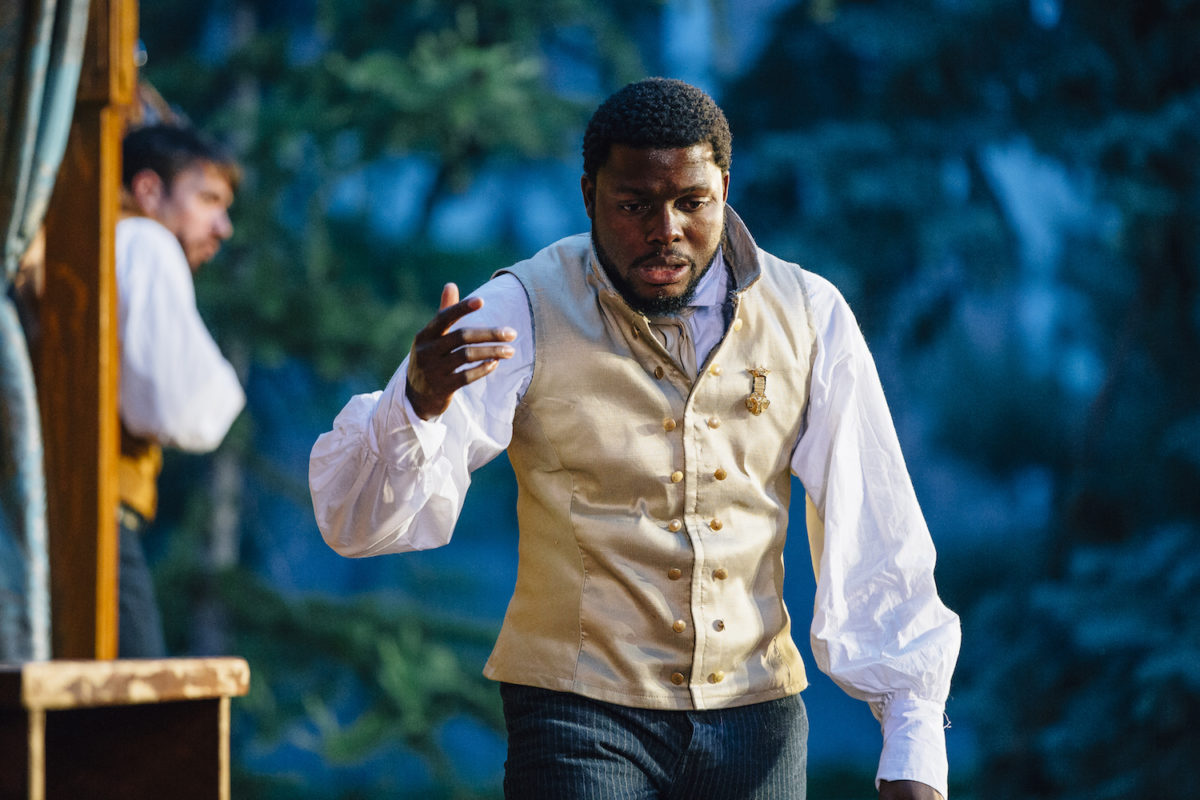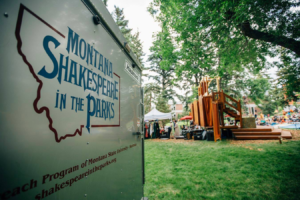
Montana Shakespeare in the Parks performs "Othello" at the Montana State University Duck Pond in Bozeman.

When Montana Shakespeare in the Parks hits the road this summer, the troupe carries with it one of Shakespeare’s most riveting and complex dramas, “Othello,” as well as more lighthearted fare with “Love’s Labour’s Lost.”
Kevin Asselin, executive artistic director of Montana State University’s acclaimed touring company, directs “Othello,” a first for the road trip, and not an easy pick.
“I wanted to present something unique to our company’s history and our audience’s history,” he said. “Othello” certainly fits the bill.
“It’s a really complicated play that requires a different kind of approach,” says Asselin.
“Othello” is also unique in the Bard’s canon. According to Asselin, it’s Shakespeare’s only “chamber play,” a domestic tragedy that explores the human propensity for “power, manipulation and jealousy and how that sends the characters down a psychological rabbit hole.”
During his tenure at MSIP, the director hasn’t shied away from challenging material, producing “Richard III” in 2016 and “Macbeth” in 2017.
“I tend to try to grab hold of the issues relevant to our audience and bring those issues to light through performance,” he says. “We’re presenting difficult concepts and ideas in a safe environment.”
Racism is part of the play’s challenging content. Although Shakespeare was clearly describing a person of color in the character of the Moorish commander (or at least, someone with darker skin than your average 17th century Brit), it wasn’t until the past 50 or 60 years that actors of color were cast as Othello. MSIP’s production also cast a black man as Casio, Othello’s trusted lieutenant.
Clever Iago, who had hoped for – and felt he deserved – Casio’s promotion, extracts revenge for being overlooked. “Iago is so smart, so able to manipulate, that he plays upon every character on stage.”
“I think what William Shakespeare was really telling us was that the world of Othello was not a black or white world,” says Asselin. “In the end, we walk away with a greater understanding of the complexity of the human condition. When we walk away, we don’t see color.”
“Love’s Labour’s Lost” brings a balance of comedy and romance to the season. Steve Cardamone, professor of acting at the University of Minnesota Guthrie Theatre Actor Training Program, directs the production.
“I think the play is hysterically funny,” he said. “Shakespeare’s not taking himself too seriously here.”
Montanans: A savvy audience for Shakespeare
Although one might think the lighter plays would be more attractive summer fare, Asselin says communities are increasingly receptive to Shakespeare’s tragedies.
“When we send out applications to our tour coordinators, they usually want to choose the comedies,” says Asselin. “This year, there were more requests for ‘Othello’ than ‘Love’s Labour’s Lost’ – that’s exciting.”
Thanks to Shakespeare in the Schools and Shakespeare in the Parks, Montanans have much higher exposure per capita to the Bard’s work than people in New York City. Audiences here have an unusual level of “sophistication, literary awareness and sympathetic approach,” says Asselin. “Such sensitivity and interest is unique to Montana.”
The state’s savvy audiences invite more complex theatre. “It allows us to bring a level of sophistication to our audience’s ears,” says Asselin. “It allows us to be brave, to step into new material.”
Shakespeare on the road: A different dimension to storytelling

This year’s troupe of 10 actors, selected during auditions in Bozeman, Houston, Chicago and Minneapolis, hits the road in two vehicles: a one-ton dually crew cab and a Ford Explorer, pulling a trailer affectionately dubbed “The Whale.”
As Asselin, who was a member of the troupe in the early 2000s, can attest: “It’s grueling.”
Actors drive to a community, which can take up to five hours, unload, build the stage, perform, tear down the stage, sleep, and get up and do it again from the third week in in June through the second week in September. They cover nearly 7,000 miles, traveling to 61 communities in Montana and the neighboring states of Wyoming, North Dakota, Washington and Idaho.
Is it worth it? Asselin says MSIP alumni typically go on to very successful careers, buoyed by the company’s national reputation.
“It’s a powerful experience for the actors and production staff, who experience storytelling in a whole different dimension, as part of an ensemble, and as an ambassador to a community that really appreciates what they do.”
Actors are embraced by the community, before, during and after the performance. “In bigger markets, they just don’t have community engagement opportunities,” says Asselin. “Out here, we all are one: the audience and the performers.”
“You train as an actor to get that kind of reward – it’s fulfilling on a spiritual level.”
As always, admission is free. To find a play nearby, visit shakespeareintheparks.org.
– Kristi Niemeyer